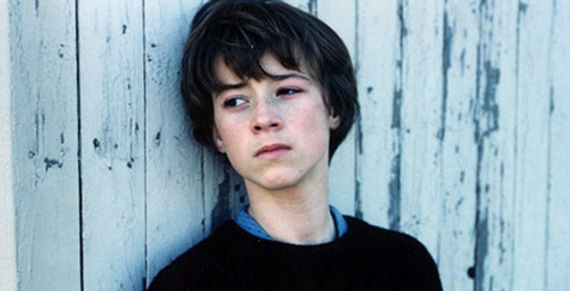

|
|||||
|
|
|
|
|
|
|
| Directed by Léa Pool |
| Canada / Switzerland / France, 1999 (fiction, 94 minutes, colour, French) |
| Also known as "13 någonting", "Nimm mich mit", "Set Me Free", "Zabierz mnie" |

|
| Image: © Catpics |
|
Film Description [in French] : "Montréal, 1963. L'adolescence d'Hanna en voit de toutes les couleurs. Vivant dans un petit appartement entourée de son père, un juif apatride, poète tourmenté et inconnu, et une mère catholique neurasthénique, la jeune fille ne voit de réconfort que lors des quelques moments de complicité qu'elle s'accorde avec son frère, Paul. Pour éclairer ses jours sombres, elle va au cinéma pour voir inlassablement Anna Karina, la Nana de Godard dans Vivre sa vie. Elle en est admirative, et connait ses répliques par coeur. Pour se sortir des colères de son père et des absences de sa mère, Hanna se confie aussi à ses des amies, Laura, une amie délurée, et sa professeur d'anglais, une femme libre et indépendante." -- Attraction (source)
Film Description:
Film Description:
Film Description [in French] : |
| Film Credits (partial): | |
| Written by: | Léa Pool, Nancy Huston |
| Produced by: | Lorraine Richard |
| Principal Cast: | Karine Vanasse, Pascale Bussières, Miki Manojlovic, Charlotte Christeler, Nancy Huston, Monique Mercure |
| Cinematography: | Jeanne Lapoirie |
| Film Editing: | Michel Arcand |
| Production Company: | Catpics Coproductions, Cité-Amérique, Haut et Court |
"[Emporte-moi is] definitely my most personal film. It's about my mother and my father
and my life."
-- Léa Pool
(source)
"Pour moi, la musique est indissociable des images. J'écris toujours avec une musique en tête: elle me nourrit en feelings, en émotions; elle me permet de rentrer dans le film [...]. Dans ce cas-ci, c'est la chanson Emporte-moi, interprétée par Marie Laforêt, qui m'a fourni l'élan créateur nécessaire. Les paroles, très belles, m'ont servi de sous-texte."
-- Léa Pool
(source)
"[Emporte-moi] is immersed simultaneously in the French new wave and the Quebecois cinema of the sixties. In preparation for the shoot, Pool and [cinematographer Jeanne] Lapoirie watched a full program of new wave films, including everything by Truffaut and Godard, whose early masterpieces Les quatre-cent coups (1959) and Vivre sa vie (1962) play [...] key roles in Emporte-moi. Like [Jean-Claude] Lauzon's Léolo, also an important influence, Pool's film combines Montreal locations with a surrealist style and an improvisational, episodic structure."
-- David L. Pike
(source)
"Emporte-moi est au départ le classique film d'initiation, le passage de l'enfance à l'âge adulte avec les rites transitoires : premières règles, premiers baisers, premières révoltes. C'est le rythme, la fraîcheur des personnages, la finesse des dialogues qui donnent au film sa riche texture dans ce Québec des années 60 renaissant de ses cendres avec les inévitables musiques du temps et un montage sonore très inspiré."
-- Odile Tremblay
(source)
|
|
|
|
|
|
|